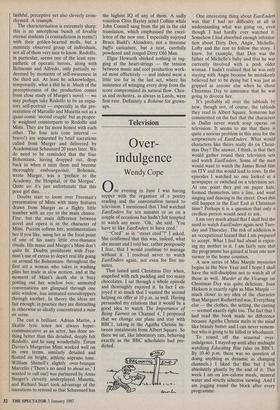Opera La Boheme (Opera North, Leeds)
For grown-ups
Rodney Wiles
The good things in David Freeman's fresh and provocative new production of Puccini's opera are very good indeed. This is verismo with a hard, clear edge stripped of the chocolate-box prettiness with which Boheme is traditionally gift-wrapped. There is no rosy glow from the stove when Rodolfo burns his play, no shaft of roman- tic moonlight when the lovers meet indeed, Rodolfo is visibly irritated by the knock on the door when he's trying to finish his notice. The action is played mostly in bright, white light, dimmed only when dramatically essential, against simple monochrome decor by David Roger in costumes that look as if they might have been assembled from Oxfam shops.
The benefits in the second act, in which so much — too much? — happens by way of character development, are immeasur- able. The stage is empty and there is no restaurant: soloists and chorus 'create' the Café Momus out of Christmas parcels that turn into stools, and that's it — no knives and forks, no glasses or veristic carry-on. The principals are all down-stage, and you can see them and what they are up to, especially Marcello and Musetta singing straight out-front at their momentous re- meeting. I heard for the first time lines of crucial importance to the understanding of the piece that are so often lost in the bustle. All the lines are sung in a much- needed and excellent new translation by Amanda and Anthony Holden, clear, faithful, perceptive yet also cleverly cross- rhymed. A triumph.
The characterisation is extremely sharp: this is no amorphous bunch of lovable eternal students (a contradiction in terms?) with their golden-hearted molls, but a . minutely observed group of individuals, not all of them very nice to know. Rodolfo, in particular, seems one of the least sym- pathetic of operatic heroes, along with Belmonte and Alfredo, only partially re- deemed by moments of self-awareness in the third act. At least he acknowledges, temporarily, what a shit he is. Much of the perceptiveness of the production comes from close study of Murger's novel — we may perhaps take Rodolfo to be an expia- tory self-portrait — especially in the pre- sentation of Marcello and Musetta not as a quasi-comic 'second couple' but as proper- ly weighted counterparts to Rodolfo and Mimi. They are far more honest with each other. The four acts (one interval bravo!) are separated by brief narrations culled from Murger and delivered by Academician Schaunard 20 years later. We do need to be reminded that the four Bohemians, having dropped out, drop back in when it suits them and become thoroughly embourgeolges. Bohemia, wrote Murger, was a 'preface to the Academy, the Hospital, or the Morgue'. Quite so: it's just unfortunate that this poor girl dies. . . .
Doubts start to loom over Freeman's presentation of Mimi with many features drawn from Murger as a flighty little number with an eye to the main chance. Fine, but the main difference between novel and opera is in the character of Mimi. Puccini softens her, sentimentalises her if you like, using her as the focal point of one of his nasty little eros-thanatos rituals. His music and Murger's Mimi don't quite fit. Doubts proliferate with Free- man's use of extras to depict real life going on around the Bohemians: throughout the first act a woman who takes in washing plies her trade in slow motion, and at the moment of Mimi's death she is busy potting out her window box; animated conversations are glimpsed through one attic window, less animated eavesdroppers through another. In theory the ideas are fair enough; in practice they are distracting in otherwise so ideally concentrated a mise en scene.
The cast is brilliant. Adrian Martin, a likable lyric tenor not always hyper- communicative as an actor, has done no- thing better than this detailed, deeply felt Rodolfo, and he sang wonderfully. Eirian Davies's Murgerian Mimi worked well on its own terms, similarly detailed and floated on bright, athletic soprano tone. William Shimell's slightly over-brusque Marcello (`There's no need to shout so,' I wanted to call out) was partnered by Anna Steiger's cleverly underplayed Musetta, and Richard Suart took advantage of the narrations to remind us that Schaunard has the highest IQ of any of them. A sadly voiceless Clive Bayley acted Colline while John Connell sang from the pit in the old translation, which emphasised the excel- lence of the new one. I especially enjoyed Bruce Budd's Alcindoro, not a tiresome buffo caricature, but a neat, carefully powdered and rouged Dirty Old Man.
Elgar Howarth shirked nothing in tug- ging at the heart-strings — the tension between music and cool production work- ed most effectively — and indeed went a little too far in the last act, where his insistence of wringing every drop from the score compromised its natural flow. Chor- us and orchestra, as always in Leeds, were first-rate. Definitely a Boheme for grown- ups.











































 Previous page
Previous page